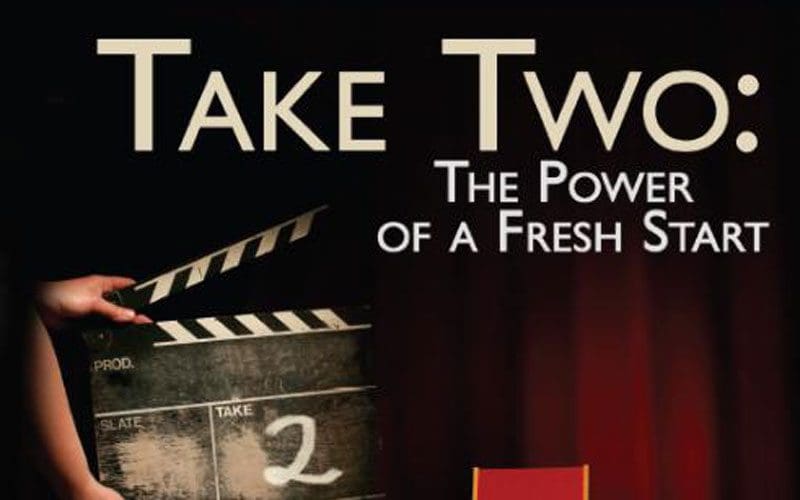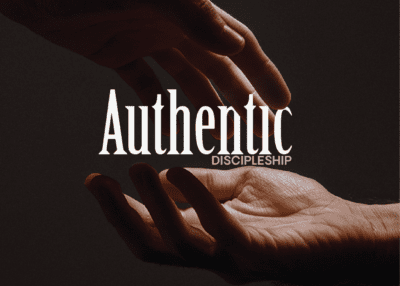“See, I have given you this land. Go in and take possession of the land that the Lord swore he would give to your fathers—to Abraham, Isaac and Jacob—and to their descendants after them.” (Deuteronomy 1:8)
The book of Deuteronomy has significantly shaped my life. 33 years ago, I read this book at one sitting in the library of the London School of Theology where I was studying. Our professor said, “If you want to feel the weight of this book you need to read it right through at one time. You’ll never get the impact of the book if you break it up.” Its 34 chapters, so that’s a fairly long read.
I read Deuteronomy, and I came out of the library that night with one overwhelming impression: I never realized that there is so much of the love of God in the Old Testament.
That discovery was defining for me. I saw clearly, for the first time, that the Bible is not two different books with two different messages—a nasty, old book full of laws and a nice, new book full of love—as if there were two different Gods, or that God had somehow changed during the course of history. No! There is one God and He never changes. We are to love Him as we fear Him and we are to fear Him as we love Him. He is as much to be loved in the Old Testament as He is to be feared in the New.
There are three questions I want to answer today: 1. Who is this book for? 2. What is this book about? 3. How does this book speak to us today?
Audience: Who is this for?
For those trusted with leadership
When he takes the throne… he is to write for himself on a scroll a copy of this law… It is to be with Him and he is to read it all the days of his life… so that he may learn to revere the Lord his God and follow carefully all the words of this law. (Deuteronomy 17:18)
Imagine this: The king is crowned, and what is the first thing he is to do? Establish policy? No. He needs to know how to establish policy first.
This is a book for everyone who leads. It is for fathers, mothers, elders, pastors and missionaries. If you are going to lead others you need to know this book.
For all of God’s people
At the end of every seven years… when all Israel comes before the Lord… you shall read this law before them in their hearing. Assemble the people – men, women and children…so they can listen and learn to fear the Lord your God and follow carefully all the words of this law. (Deuteronomy 31:10-12)
The entire book of Deuteronomy was to be read every seven years before the whole community. This book is about God’s will for the lives of His people: Children need to hear what’s in this book. It’s for families. It’s for the whole church. Why? So that the people could learn to fear the Lord and obey God’s commands.
For people who have forgotten the Lord
More than 800 years after Deuteronomy was penned, 800 years after Moses spoke these words, God used this book to ignite an extraordinary change in the nation of Israel.
God’s people went through some dark times under some dreadfully evil kings. Men like Manasseh, who sacrificed his own son in the fire (how’s that for national leadership?), practiced sorcery, and consulted mediums and spiritists (2 Kings 21:6). It’s hard to imagine a darker day among God’s people.
I don’t suppose Manasseh ever read the book of Deuteronomy, let alone made a copy of it. If he knew it, he certainly paid no attention to it. During his reign this book was completely forgotten.
Manasseh reigned for 55 years. What happens after a half a century of national leadership without the Word of God? You get a generation that does not know the Lord and cannot tell good from evil or truth from error.
Then Josiah came to the throne. God was at work in Josiah’s heart. When he was just 18 years old, the High Priest (a man called Hilkiah) found a dusty, old copy of this book in the temple. It was probably written by one of the previous kings. God’s Word was covered in dust and forgotten by his people for half a century.
Josiah called for this book to be read and when he heard the words of Deuteronomy, He tore his robes because he saw how far the nation was from what God had called them to pursue. He gave himself to prayer and then launched a reformation that changed the face of the nation for a generation.
God has used this book powerfully in the past and I believe that He will use it at this great moment in our lives today.
Storyline: What is this about?
God had given the Promised Land to Abraham and his descendents. But three generations later (Abraham, Isaac, Jacob, Joseph) there was a famine in the Promised Land and the family to whom God had given great promises went to Egypt where God provided them with food.
They stayed in Egypt for the next 400 years, not because they wanted to, but because they were oppressed and eventually became slaves there. So, they called out to God, and God raised up Moses, who led the people out of Egypt in the exodus. God made a covenant with them at Mount Horeb (also called Mount Sinai): “I will be your God: You will be my people.”
Moses reviews for us what happened next when God’s people went to Mount Sinai. Mount Sinai is where God gave them the Ten Commandments: The Lord our God said to us at Horeb [Sinai], ‘You have stayed long enough at this mountain. Break camp and advance into the hill country of the Amorites… I have given you this land. Go in and take possession… (Deuteronomy 1:6, 8)
They were organized and now it was time to move forward. They had appointed leaders (1:9) and sent out spies (1:19), and that’s when fear set in (1:26). They were unwilling to go up into the land (1:26), instead they grumbled in their tents (1:27), and said, “Where can we go, our brothers have made us lose heart?” (1:28)
God’s people were so unhappy that they were talking about stoning Moses and Aaron. Then God stepped in, and He said about that generation:
Not one of them will ever see the land I promised on oath to their forefathers. No one who has treated me with contempt will ever see it (Numbers 14:23).
So, the people wandered in the desert for an entire generation. They could not go back to Egypt. They could not go forward to Canaan. They were stuck—believing people going nowhere. God was providing for them, but nothing of the mission of God was going forward.
“Thirty eight years passed… and that entire generation of fighting men had perished from the camp, as the Lord had sworn to them. The Lord’s hand was against them until He had completely eliminated them from the camp.” Deuteronomy 2:14-15
When the last of the fighting men of that generation had died God told Moses to move forward (2:16). They fought two battles—against Sihon (2:24ff) and Og (3:1ff)—and these two great victories brought them right to the threshold of the Promised Land.
So, after 40 years of wandering in the desert, God’s people are ready to cross the river Jordan. They are right on the verge of the Promised Land. They set up camp, and Moses speaks to them for the last time, “These are the words Moses spoke to all Israel in the Desert east of Jordan” (1:1).
It’s now the “fortieth year” since the exodus, “the first day of the eleventh month” (1:3). So, if they were using our calendar (which, of course, they were not) it would be November 1st. We know that entered the Promised Land on “the tenth day of the first month” (Joshua 4:19). That would be January 10th. Deuteronomy records what God taught His people during the 70-day countdown to entering the Promised Land.
It had taken them 40 years to get here. Now God spends these days preparing this new generation of His people for the challenge and opportunity that lay ahead of them. Moses begins with the flashback: Let me take you back before any of you were born. We were at Horeb, and God called us to move forward (1:6). This is what happened a generation ago. 40 years ago your parents were gathered here. If they had believed God, you would have been born in Canaan. But fear took over, and so you were born in the desert and that’s all you have ever known. Now God is calling you. It’s your moment of opportunity. It’s your moment of destiny.
That’s the story. It’s about God’s people facing a major transition. This book is God’s Word for people on the threshold of an entirely new experience. You can see why I am drawn to the book of Deuteronomy—believers of the cusp of something new, the church embracing its mission.
Application: How does this speak to us today?
The message of this book is about what it takes for people with a faith to become people with a mission. The generation that died in the desert believed in God. They had experienced Him in the miracle they had gone through in the exodus. But they acted in unbelief.
Warren Wiersbe says, “Unbelief wastes time.”[1] A journey that should have taken 11 days took 40 years. How many years of your life have been wasted in unbelief? God did so much for these people. They did so little for Him. So much could have been done, so little was accomplished.
The great question in Deuteronomy is: How can the people of God with a faith become the people of God with a mission? How can you move from being a person with a faith to a person with a mission? How can we move from being a church with a faith to a church with a mission? That’s what it’s about. What is it going to take to move a person from being a person of faith to being a person of mission?
Two things must happen:
1. You have to break free from being defined by your past
Think about the people standing on the verge of the Jordan, less than 100 days from entering into the land of Canaan. They had all been born in the desert—they didn’t know anything else
Imagine you’re in your late 30s, and you were born in the desert. You have a young family of your own, and your children were born in the desert too. God has been good to you. He has provided manna every day, and you’ve never known anything else. You believe in Him, and you’re grateful for all He has done for you. But your whole life has been shaped by the instincts and choices of your parents. They were believers, but they were so cautious, so afraid of risk, and that has become defining for you.
The only faith you have ever experienced is a faith that leaves you wandering around, experiencing God’s provision, but not doing anything to advance His purpose in the world. You’re a believer, but your life has no defining mission! Some of you will be saying, “That’s me!” If your life is going to count for God you need to break free from being defined by your past. You need to be freed from thinking that believing in God and enjoying His provision is all there is.
2. You have to overcome your fear of the future
God was calling these people to do some things none of them had ever done before. Moses says, “We’re going to live in houses!” How do you live in a house when the only thing you’ve ever known is sleeping under canvas? Moses says, “We’re going to plant crops and raise harvests!” But the only thing you have ever known is gathering manna from heaven?
God is leading them to a place they have never been and to a life they have never known. You are going to a new school or you are starting a new marriage, and everything is new. When you move into something you have never experienced before, there are always fears.
Here’s the challenge God’s people were facing: Can we break free from the past, or will the past always shape us? Can I overcome my fears for the future, or will these fears always hold me back?
And so Moses gets up to speak the words in this book to a community of believers who were defined by the past and afraid of the future, people with a faith but not with a mission, and what does he speak to them about?
Moses spoke to them about the call of God, because when God calls you He gives you the power to break free from the defining patterns of the past. And Moses spoke to them about the love of God, because it is the love of God when it pours into your own soul that empowers you to overcome your fears of the future. Perfect love casts out fear.
These people heard the call of God, experienced the love of God and 70 days later they moved into the land of Canaan. So, this book has everything to do with us and so much to say to all of us who need to make a fresh start today.
Run the Bible story forward 1,300 years to the time of Jesus and we find Him with His disciples on the night that He was betrayed. Picture these men gathered around Jesus. They have a faith, but they don’t yet have a mission. They are believers, but nothing about them is changing the world. Then “Jesus showed them the full extent of His love” (John 16:33), because the place is full of fear and they are all so discouraged.
After the crucifixion, the talk among the disciples was all about going fishing, retreating to what is safe and familiar. Then the risen Christ comes into the room. He breathes on them and says, “Receive the Holy Spirit… “As the father has sent me, so I am sending you” (20:21-22). When they receive the love of Christ and the call of Christ, men of faith become men on a mission.
If you ask, “Why are we stretching ourselves to open these new campuses? Why are we making these sacrifices? Why in the world are we doing this?” The answer is: Because God calls us to be more than people with a faith. He calls us to be people on a mission.
People with a faith become people with a mission when the love of Christ enables you to overcome fear, and the call of Christ breaks you free from being defined by the past.
[1] Nelson’s quick reference chapter by chapter bible commentary p107.






